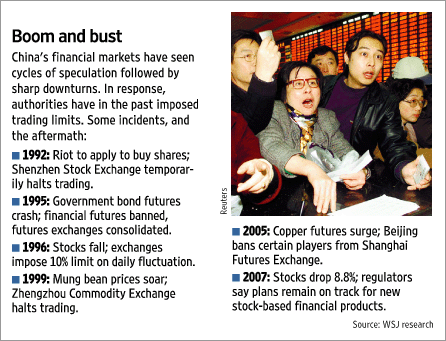 Source of graphic: online version of the WSJ article cited below.
Source of graphic: online version of the WSJ article cited below.
Market participants consider futures the next big thing for China’s financial-sector development. The exchange currently trades contracts in copper, aluminum, natural rubber and fuel oil — commodities that China imports in large quantities.
But trading is largely closed to foreigners. Futures on financial products, such as stock indexes and currencies, don’t yet exist in China, though they are integral to other market economies.
Reviving Case for Futures
China banned exchange-traded financial derivatives in 1995 in response to a meltdown in its bond-futures market. Within minutes, $10 billion in market value was wiped out, in what remains the country’s most damaging market debacle to date. By contrast, last week’s drop in stocks has revived the case for financial futures.
Officials now say share prices probably wouldn’t have fallen so abruptly on Feb. 27 if index futures existed. That’s because shares probably wouldn’t have surged as quickly as they did last year — the Shanghai Composite Index rose 130% — if investors had had the chance to use stock-index futures to bet against the market on its way up.
Futures contracts are thought to build more of a two-way market, because they give investors the right to buy — and sell — based on expectations about how the value of an index, stock, currency or commodity might move within a particular time frame. Without them, the only way for investors to make money is in a rising market, a risky prospect over the long term.
For the full story, see:
(Note: the online version had a slightly different title: "China Tries Longer-Term Response to Stock Volatility.")

